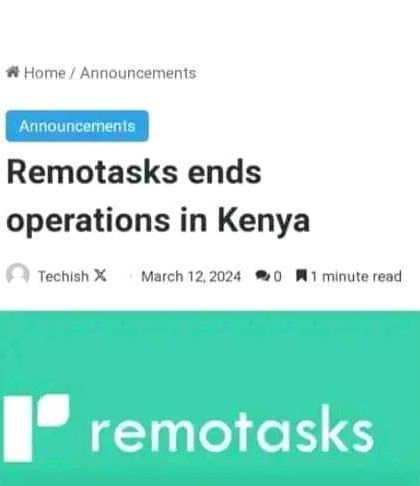Search This Blog
"Truth comes only to conquer those who have lost the art of receiving it as a friend." ~ Ravi Thakur
Featured
- Get link
- X
- Other Apps
Remotasks Website Shutdown Leaves Kenyan Youth in Limbo: Has God Stopped Listening to William Ruto?
Reports emerged on the evening of Tuesday 12 March 2024, as numerous workers shared an email allegedly sent by the company, notifying them of the decision to cease operations in Kenya. The email cited 8 March 2024 as the date for terminating operations, catching many users off-guard.
"We are reaching out with an important announcement regarding Remotasks operations in your location. We are discontinuing operations in your current location effective March 8, 2024.
"As part of this change, you have been off-boarded from your current project," reads an excerpt from the email.
This development comes on the heels of recent praise from President William Ruto towards the platform, highlighting its role in empowering Kenyan youth...and more importantly, providing them with the wherewithal to pay taxes, the new catchphrase in Kenya that Ruto is building.
Just weeks prior, during a visit to ICT labs in January, President Ruto commended Brian Kipchumba, a university student who had found success on Remotasks, earning a substantial monthly income.
However, this closure adds to a series of setbacks experienced by William Ruto in recent times. From legal challenges thwarting his affordable housing scheme to his own attorney general declaring the housing levy hatched to fund the project illegal, Ruto's plans have consistently faced obstacles. Even his proposed deployment of Kenya Police to Haiti was halted by the courts.
Ruto's initial optimism, symbolised by his proclamation early in his presidency that "those who believe in God won," has seemingly waned in the face of mounting challenges. Despite his confidence after winning the presidency and his maiden foreign trip to Korea where he made the strange proclamation, and his spectacular fallout with the Kenyan church, Ruto's fortunes have taken a downturn.
One may question why Ruto's initiatives are faltering and why his endeavors seem plagued by setbacks.
While some may attribute it to divine intervention, a more practical analysis suggests a combination of factors at play. Ruto's ambitious plans may have lacked thorough feasibility studies, effective implementation strategies, or adequate stakeholder consultation, leaving them vulnerable to legal, social, logistical, and political hurdles.
The sudden shutdown of the Remotasks website serves as a poignant reminder of the challenges faced by Kenyan youth in the digital economy. It also prompts reflection on William Ruto's struggles and the need for comprehensive planning and execution in addressing socio-economic issues. As Kenya navigates its path forward, it is imperative to learn from past experiences and adopt a pragmatic approach to policymaking and governance.
- Get link
- X
- Other Apps
Popular Posts

The One On Why Uganda Produces Shitty Ads
- Get link
- X
- Other Apps

Of Australian Bogans Masquerading As Creatives In Nairobi Agencies
- Get link
- X
- Other Apps

.jpeg)

.jpeg)
Comments
Post a Comment